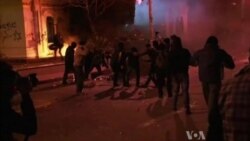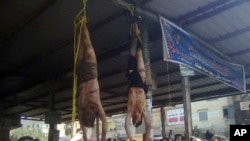CAIRO —
As the security situation in Egypt continues to deteriorate, a growing number of citizens are taking the law into their own hands.
In some neighborhoods across Cairo and the country, neighbors make up for the lack of police protection by banding into watch groups. In others, Islamist leaders have made inroads, calling for informal militias to provide security when needed.
Tarek Bedir, of the conservative organization Gama'a Islamiya, put together an informal militia during a recent police strike.
Bedir explained that his group would step in to protect lives, and the belongings of both the people and the state, if the police didn't go back and do their jobs. His group, now part of the political fabric of post-revolution Egypt, is considered a terrorist group by the United States.
Such informal security patrols are the alternative to Egypt's long-reviled police force, which largely disappeared after the 2011 revolution. Many of the police who eventually came back complain they are ill-treated - poorly paid and under-armed, and thrust far too much into the nation's political upheaval. Once again, many have walked off the job.
Egypt's top prosecutor, Talat Abdullah, this week urged ordinary Egyptians to step in to fill the void.
Police officer Islam Mabrouk said he thinks that's a terrible idea. He said the prosecutor general was wrong when he gave civilians the right to arrest each other because it turned everyone into policemen. Now anyone, Mabrouk said, can arrest people on the streets.
Or worse: a mob-lynching of two suspects in a Nile Delta town prompted Justice Minister Ahmed Mekki to say it was a sign of the death of the state.
Heba Morayef, of Human Rights Watch in Cairo, also is alarmed by the trend of civilians taking the lead in security.
"This new license that's been given to private citizens to become involved in violence is an even more dangerous one. Because you see a weakening of the role of the state, and honestly this opens the door to vigilantism moving forward, and that's not a healthy environment in which to protect rights ultimately," said Morayef.
While some Egyptians have called for the military to intervene, Morayef said it would be better to focus on reforming the police into a responsible force.
"Nothing has happened yet, but at least you're dealing with a police force, and there could be top-down decisions to eventually, over the next decade, change police behavior," said Morayef.
With Egypt's political scene in a stalemate, however, a decision to even start that process seems a long way off.
In some neighborhoods across Cairo and the country, neighbors make up for the lack of police protection by banding into watch groups. In others, Islamist leaders have made inroads, calling for informal militias to provide security when needed.
Tarek Bedir, of the conservative organization Gama'a Islamiya, put together an informal militia during a recent police strike.
Bedir explained that his group would step in to protect lives, and the belongings of both the people and the state, if the police didn't go back and do their jobs. His group, now part of the political fabric of post-revolution Egypt, is considered a terrorist group by the United States.
Such informal security patrols are the alternative to Egypt's long-reviled police force, which largely disappeared after the 2011 revolution. Many of the police who eventually came back complain they are ill-treated - poorly paid and under-armed, and thrust far too much into the nation's political upheaval. Once again, many have walked off the job.
Egypt's top prosecutor, Talat Abdullah, this week urged ordinary Egyptians to step in to fill the void.
Police officer Islam Mabrouk said he thinks that's a terrible idea. He said the prosecutor general was wrong when he gave civilians the right to arrest each other because it turned everyone into policemen. Now anyone, Mabrouk said, can arrest people on the streets.
Or worse: a mob-lynching of two suspects in a Nile Delta town prompted Justice Minister Ahmed Mekki to say it was a sign of the death of the state.
Heba Morayef, of Human Rights Watch in Cairo, also is alarmed by the trend of civilians taking the lead in security.
"This new license that's been given to private citizens to become involved in violence is an even more dangerous one. Because you see a weakening of the role of the state, and honestly this opens the door to vigilantism moving forward, and that's not a healthy environment in which to protect rights ultimately," said Morayef.
While some Egyptians have called for the military to intervene, Morayef said it would be better to focus on reforming the police into a responsible force.
"Nothing has happened yet, but at least you're dealing with a police force, and there could be top-down decisions to eventually, over the next decade, change police behavior," said Morayef.
With Egypt's political scene in a stalemate, however, a decision to even start that process seems a long way off.












